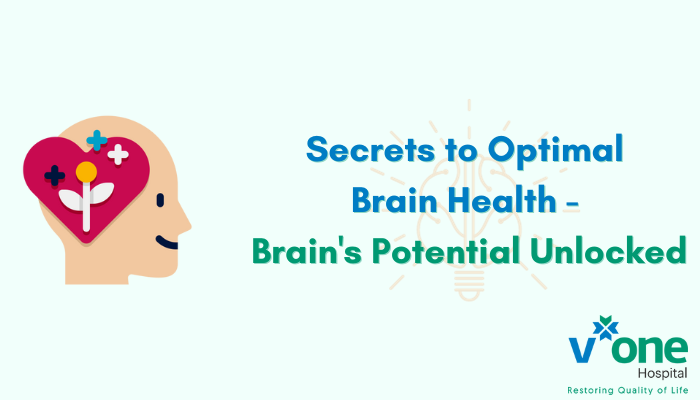Lifestyle Changes for Optimal Brain Health – Brain’s Potential Unlocked
In our modern, fast-paced world, where information travels at the speed of light and stress is a constant companion, the significance of neurological health cannot be overstated. Neurological disorders, ranging from Alzheimer’s and Parkinson’s to depression and anxiety, have become increasingly prevalent, affecting millions of lives globally. The good news, however, is that there are proactive steps we can take to support our brain health and potentially reduce the risk of these disorders.
In this blog, we will explore the crucial role that lifestyle changes play in promoting neurological well-being, focusing on exercises, diets, mental stimulation, sleep, stress management, and social connections.
Understanding Neurological Health
Neurological health encompasses the overall well-being of our nervous system, which includes the brain, spinal cord, and peripheral nerves. Disorders in this system can lead to a myriad of issues, impacting memory, movement, and even mood. Understanding these disorders is the first step towards prevention. Alzheimer’s, for instance, is characterized by memory loss and cognitive decline, while Parkinson’s affects movement control. By adopting a healthy lifestyle, we can potentially mitigate the risk factors associated with these conditions.
The Role of Exercise in Brain Health
Regular physical activity is not just vital for cardiovascular health; it also significantly benefits the brain. Exercise increases blood flow to the brain, promoting the growth of new neurons and enhancing overall brain performance. Activities like aerobics, yoga, and even simple daily walks can improve memory, focus, and creativity. Moreover, exercises that challenge the brain, such as puzzles and strategic games, enhance cognitive functions, acting as a shield against neurological disorders.
The Impact of Diet on Neurological Health
A balanced and nutritious diet is fuel for the brain. Foods rich in antioxidants, omega-3 fatty acids, vitamins, and minerals provide the necessary nourishment for brain cells. Berries, leafy greens, fish, nuts, and whole grains are known to boost brain health. Additionally, staying hydrated is crucial as dehydration can impair attention and long-term memory. By adopting a brain-healthy diet, individuals can protect their cognitive abilities and support the brain’s natural functions.
Mental Stimulation and Brain Health
Keeping the brain active and engaged is essential for its health. Mental exercises, like puzzles, crosswords, and learning new skills, create new neural pathways, improving memory and cognitive flexibility. Practices such as meditation and mindfulness not only reduce stress but also enhance brain connectivity, improving overall brain function. By incorporating these activities into daily routines, individuals can stimulate their minds and bolster their neurological resilience.
The Role of Sleep in Brain Function
Quality sleep is when the brain restores and consolidates memories, making it indispensable for neurological health. Lack of sleep impairs judgment, focus, and the ability to learn. During deep sleep, the brain clears out toxins that accumulate during the day, crucial for preventing neurological disorders. Establishing a regular sleep schedule, creating a relaxing bedtime routine, and optimizing sleep environment are key steps in ensuring restorative sleep, thereby supporting optimal brain function.
Stress Management and Neurological Health
Chronic stress is detrimental to brain health. It accelerates the aging of the brain and impairs its ability to function efficiently. Stress-reducing activities such as yoga, deep breathing exercises, and hobbies provide a calming effect, reducing cortisol levels and preserving brain cells. By managing stress, individuals can protect their brain from the damaging effects of prolonged stress and maintain cognitive abilities well into old age.
Social Connections and Brain Health
Humans are social beings, and meaningful social interactions are vital for brain health. Engaging with others stimulates the brain, enhancing emotional well-being and cognitive functions. Strong social connections have been linked to a reduced risk of cognitive decline. Whether through family, friends, or community activities, fostering social connections can provide emotional support, reduce stress, and improve overall brain health.
Wrapping Up
Incorporating these lifestyle changes – embracing physical activity, maintaining a balanced diet, engaging in mental and social activities, ensuring adequate sleep, and managing stress – can significantly enhance neurological health. By taking proactive steps to support our brain, we not only improve our quality of life but also reduce the risk of neurological disorders. The key lies in embracing these changes as part of our daily routines, unlocking the full potential of our most vital organ, and ensuring a healthier, sharper, and more vibrant future.

